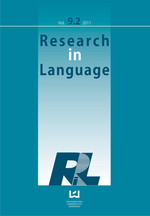A More Explicit Framework for Evaluating Objectivity and (Inter)Subjectivity in Modality Domain
A More Explicit Framework for Evaluating Objectivity and (Inter)Subjectivity in Modality Domain
Author(s): Gholamreza Medadian, Dariush Nezhadansari MahabadiSubject(s): Syntax, Pragmatics, Philosophy of Language
Published by: Wydawnictwo Uniwersytetu Łódzkiego
Keywords: modality; objectivity; (inter)subjectivity; performativity;
Summary/Abstract: In this paper we propose a more explicit framework for definition and evaluation of objectivity and (inter)subjectivity in the modality domain. In the proposed operational framework, we make a basic distinction between the modality notions that serve an ideational function (i.e., dynamic modal notions) and those with an interpersonal function (i.e., deontic and epistemic evaluations). The modality notions with ideational and interpersonal functions are content and person-oriented, respectively. While all dynamic modal notions are characterized by objectivity, deontic and epistemic modal notions may display a degree of (inter)subjectivity depending on their embedding context. Our main claim is that (inter)subjectivity can hardly be argued to be the inherent property of certain modality forms and types, but rather it is essentially a contextual effect. We functionallyoperationally define (inter)subjectivity as the degree of sharedness an evaluator attributes to an epistemic/deontic evaluation and its related evidence/deontic source. (Inter)subjectivity is realized by (at least) one or a combination of three contextual factors, viz. the embedding syntactic pattern, the linguistic context and the extralinguistic context of a modality marker. Since both descriptive and performative modal evaluations involve a degree of (inter)subjectivity, performativity, which refers to speaker’s current commitment to his evaluation, is viewed as an independent dimension within modal evaluations and plays no part in the expression of (inter)subjectivity.
Journal: Research in Language (RiL)
- Issue Year: 16/2018
- Issue No: 1
- Page Range: 65-98
- Page Count: 34
- Language: English

